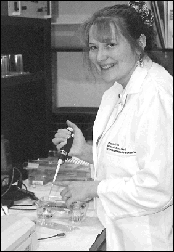York professor is first winner of new medical research award

CELL BIOLOGY: York professor Imogen Coe is being recognized for her promising research. It is pure scientific research, but she says it is also relevant to cancer chemotherapy.
IMOGEN COE'S RESEARCH IS RELEVANT TO CANCER CHEMOTHERAPY
York University biology professor Imogen Coe is the first recipient of the Banting Research Foundation's BioChem Pharma/BioChem Therapeutic Award, valued at $20,000.
Named after insulin discoverer Sir Frederick Banting, the Banting Research Foundation was founded in 1925. It aims to support young medical researchers who will go on to make discoveries that will benefit world health. This award is a new joint program between the foundation and a member of the pharmaceutical industry.
Prof. Coe's research is in basic cell biology. Specifically, she is studying a group of proteins called transporters that move compounds known as nucleosides across cell membranes. Nucleosides are very important for the general well-being of cells and are the building blocks of DNA. Although Coe's work is by way of being pure research, it is also "highly relevant to cancer chemotherapy, since a number of important anti-cancer drugs look very much like nucleosides and enter cells through these transporters," she says.
Coe is part of an international team that first cloned nucleoside transporters capable of moving anti-cancer drugs into human body cells. Now she is identifying ways to stimulate the activity of transporters, in the process improving their efficacy in delivering cancer-fighting drugs.
BioChem Pharma, the international biopharmaceutical company that funded Coe's award, is developing new drugs to treat a variety of cancers. "It's a natural fit," Coe says. "They're looking for people they can connect with to help understand how cells work. Hopefully, it's the beginning of a longer-term relationship, involving collaborative research, perhaps involving direct studies of some of the new drugs that BioChem Pharma is developing."
Because cancer, in all of its manifestations, is the uncontrolled growth of cells, companies are attempting to combat it by synthetically constructing drugs which look slightly different from naturally-occurring nucleosides. "The hope is that these analog drugs will stop cells from dividing and promote cell death," says Coe. "The only way these analog drugs will get into cells is through the group of proteins I study.
"While there has been a lot of work on developing new drugs, there has been very little on the cellular aspects of how the drugs get into cells - which is the critical component. If the drugs don't get in, they can't kill the cancer cells.
"We need to understand how they get in and how to make more of them get in faster," Coe says. "If we can do this in patients, we could give them lower drug dosages, stimulate cells so that they absorb more medication and reduce some of the unpleasant side effects associated with chemotherapy."
In the past, nucleoside analog drugs used to combat leukemia and other cancers distributed in the blood had a much greater chance of success than nucleoside analog drugs used to fight solid tumours, such as breast or prostate cancer, says Coe. "But now that new drugs are having some success, we need to understand how nucleoside transporters work in these complex tissues."
An additional important project in Coe's lab is the study of the role of transporters in controlling the activity of one naturally-occurring nucleoside called adenosine.
"Adenosine is very important in maintaining a healthy heart and brain," she says. "Adenosine gets in and out of cells through the nucleoside transformers I work on. There are some data to suggest that hormones such as estrogen regulate transformers, and we believe this regulation of transporters may affect how well adenosine can act on heart and brain tissue."
Coe first came to York in June 1997. Prior to that, she did graduate studies at the University of Victoria, and was a post-doctoral fellow for five years, first in the biology department at the University of California at San Francisco, then in the biochemistry department at the University of Alberta, and in the oncology department at the Cross Cancer Institute in Edmonton. Now, as an independent scientist, she is faced with the need to attract funding for her research work.
"The kind of research I do is very expensive, so I'm constantly looking for additional sources of funding," says Coe. "It allows us to move forward so much faster." So far, in addition to the Banting Research Foundation grant, Coe has succeeded in obtaining an NSERC (Natural Sciences and Engineering Research Council of Canada) grant valued at approximately $29,650.
Coe credits her York laboratory team - made up of a number of students and technician Ying Zhang ("who's a real asset") - for their "excellent" work.
Though Coe is pleased when her research proves to be applicable, she concedes that she is "more driven by interest in how cells work. They're amazing little machines," she says, "and we're trying to peel back the layers of understanding. Fortunately, some of what we're doing may help improve some types of chemotherapy. It's kind of an added bonus."
The Banting awards, Coe points out, are "quite competitive" - making it all the more noteworthy that this is the second year in a row the foundation has awarded a York scientist. In 1997, Prof. Chun Peng, another cell/molecular biologist at York University, won a Banting Research Foundation grant.
As for the war against cancer, Coe holds out little hope for an immediate victory by the forces of science and medicine. "Cancer is an incredibly smart disease," she says. "Often we're disappointed in what we think are promising new treatments, and every time we think we've come up with a new treatment, there's still a huge way to go."
Almost certainly, she says, defeating cancer "is going to take a huge effort for a long time by a lot of people."



